Virtualization is the default for many cloud deployments, but for raw performance, predictable resources, and complete system control, nothing beats dedicated hardware. Selecting the best bare metal server provider is a critical decision for businesses running high-traffic applications, large databases, or latency-sensitive workloads that demand maximum efficiency.
Unlike shared or virtualized environments, bare metal gives you exclusive, direct access to the physical server. This means no hypervisor overhead and no resource contention from “noisy neighbors,” just pure processing power at your command. This direct access is essential for performance-critical tasks like running a Proxmox private cloud, managing large e-commerce platforms on Magento, or deploying secure VoIP infrastructure with SIP trunks and a Virtual PBX. For example, a Proxmox deployment on bare metal allows direct passthrough of hardware like GPUs or network cards to virtual machines, a task that’s complex or impossible in standard public cloud environments.
This guide moves beyond marketing claims to deliver a comprehensive analysis of the top 12 providers. We’ll dive deep into their offerings, comparing them on crucial factors like hardware specifications, pricing models, management features, API capabilities, and the quality of their technical support. For developers and DevOps teams, this means understanding which provider offers the best automation tools and root access flexibility. For IT managers, it means identifying the most cost-effective and secure options for colocation or managed services.
Each entry in this listicle includes a detailed breakdown, real-world use cases, and honest assessments of both strengths and limitations. You’ll find direct links and practical insights to help you not just choose a provider, but also to effectively deploy and manage your bare metal infrastructure for peak performance and reliability.
1. ARPHost, LLC
ARPHost, LLC solidifies its position as a top-tier bare metal server provider by delivering a potent combination of enterprise-grade hardware and exceptionally personalized, U.S.-based support. It carves out a unique space in the market, appealing directly to small and mid-sized businesses, developers, and MSPs who require the raw power of dedicated servers without the complexity and impersonal nature of hyperscale cloud providers. The company’s philosophy centers on providing robust, full-stack IT solutions that feel like an extension of your own team, a value proposition that resonates strongly with its customer base.
This hands-on approach is evident in their rapid provisioning times and transparent pricing models, which eliminate the guesswork often associated with infrastructure costs. ARPHost stands out by pairing high-performance bare metal with a comprehensive suite of related services, including Proxmox-based private clouds and secure, immutable backups. This integrated ecosystem makes it a compelling, all-in-one choice for organizations looking to scale confidently.
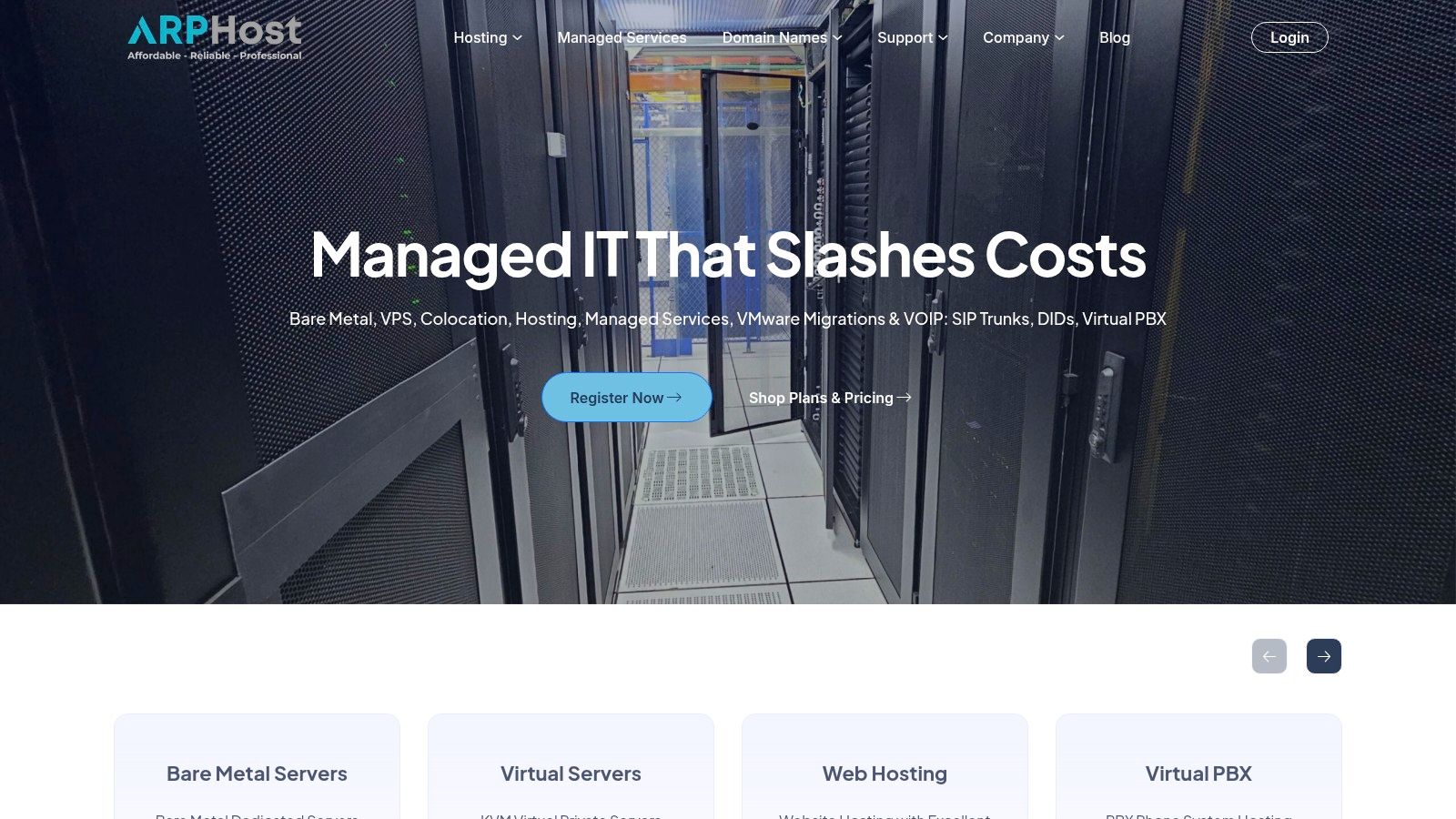
Why ARPHost is Our Top Choice
ARPHost excels by merging the performance of dedicated hardware with the flexibility of modern virtualization and the assurance of high-touch managed services. This makes them an ideal partner for businesses that have outgrown shared hosting but are not yet ready to hire a full-time, in-house systems administrator. The provider’s offering is particularly strong for those who need more than just a server; they need a reliable technology partner.
Their Proxmox Private Cloud and Proxmox Backup as a Service solutions are significant differentiators. This stack allows IT teams to build secure, scalable private cloud environments on dedicated hardware, complete with immutable, encrypted backups for robust disaster recovery. This is a powerful, cost-effective alternative to more complex and expensive VMware or Hyper-V setups, giving SMBs access to enterprise-level resilience.
Expert Insight: “ARPHost is responsive, knowledgeable, and genuinely invested. The performance has been flawless, and the pricing is more than fair for the level of service and hardware provided.” – Verified Customer Testimonial
Key Features and Use Cases
- Flexible Service Models: Choose between unmanaged plans for full root access or managed services where ARPHost’s experts handle server maintenance, security, and updates.
- Proxmox Virtualization Stack: Leverage Proxmox for powerful private cloud deployments on your bare metal servers, offering a feature-rich, open-source alternative to VMware.
- Secure Backup Solutions: Implement Proxmox Backup as a Service for immutable, encrypted off-site backups, protecting critical data from ransomware and accidental deletion.
- Rapid Provisioning & One-Click Apps: Get servers deployed quickly and install applications like WordPress, Magento, or Joomla instantly, accelerating development and launch timelines.
- All-in-One Infrastructure: Consolidate vendors by bundling bare metal servers with colocation, business voice (VoIP) services, and domain management.
Technical How To: Setting Up a Proxmox Private Cloud
A common task is creating a private cloud. With a managed ARPHost bare metal server, the process is streamlined:
- Order the Server: Select a bare metal server with sufficient CPU cores, RAM (e.g., 128GB+), and NVMe storage.
- Request Proxmox Installation: During checkout or via a support ticket, request that the ARPHost team install and configure Proxmox VE as the base operating system.
- Access Web UI: Once provisioned, you’ll receive credentials to the Proxmox web interface, accessible at
https://your-server-ip:8006. - Create VMs: From the UI, you can now easily upload ISO images and create virtual machines for different applications, isolating workloads on your dedicated hardware.
Pricing and Plans
| Service Type | Starting Price (Monthly) |
|---|---|
| Bare Metal Servers | $99.99 |
| KVM VPS | $4.00 |
| Shared Web Hosting | $5.99 |
| Colocation | $99.00 |
| Virtual PBX | $29.95 |
Pricing is based on entry-level configurations. For full specifications and configurable options, you can explore the details of their bare metal server plans.
Pros and Cons
| Pros | Cons |
|---|---|
| ✅ High-Touch 24/7 Support: U.S.-based expert support praised for its responsiveness and expertise. | ❌ Limited Global Footprint: Primarily U.S.-focused datacenters may not be ideal for services requiring low latency in Europe or Asia. |
| ✅ Modern Infrastructure Stack: Proxmox-based cloud and backup solutions offer enterprise features at an SMB-friendly price point. | ❌ Compliance Documentation: Formal certifications like SOC 2 or HIPAA are not prominently listed and require direct verification for regulated industries. |
| ✅ Transparent Pricing: Clear, cost-effective plans make it easy for businesses to budget for infrastructure. | |
| ✅ All-in-One Provider: Simplifies vendor management by offering hosting, backups, colocation, and voice services under one roof. |
Website: https://arphost.com
2. Atlantic.Net — Bare Metal & Dedicated Servers
Atlantic.Net — Bare Metal & Dedicated Servers
Built for organizations that demand performance, Atlantic.Net combines true single‑tenant hardware with a security‑first operational model. The result is predictable performance, industry‑focused compliance, and always‑available support from experienced U.S.-based engineers.
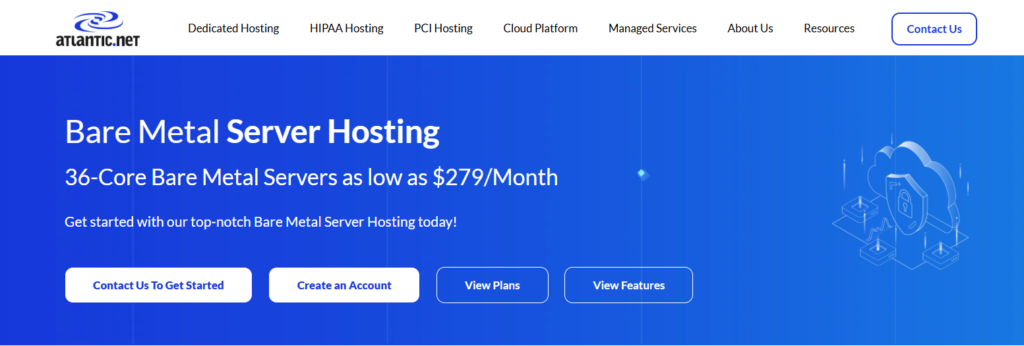
In continuous operation since 1994, Atlantic.Net is one of the most established dedicated and bare metal hosting providers in the United States. More than 31 years of experience shows in every layer of the platform—well‑designed hardware options, seasoned engineering staff, and a deep understanding of the demands faced by healthcare, financial, and other regulated industries.
Key Features
- 100% Uptime SLA
Reliable, clearly defined uptime commitments across network, infrastructure, and hardware to support uninterrupted operations.
- 24/7/365 U.S.-Based Support
Direct phone and email access to knowledgeable U.S. engineers—no outsourcing, no chat bots, and no automated runaround.
- SOC 2 & SOC 3 Data Centers
Enterprise-grade security controls and documented operational processes designed for audit‑ready hosting.
- Decades of Experience
Serving businesses since 1994 with a consistent track record in secure, compliant infrastructure delivery.
- Fully Isolated Bare Metal
Single‑tenant machines ensure consistent performance with complete control over all compute resources.
- Configurable Hardware
Flexible CPU, RAM, and SSD/NVMe storage options tailored to the performance profile of any application.
- Built for Compliance
Infrastructure engineered specifically to support HIPAA, PCI, and other high‑security environments.
Ideal Use Cases
- Healthcare platforms that must meet HIPAA requirements
- FinTech and payment systems needing PCI‑aligned hosting
- Security‑sensitive enterprise applications requiring SOC 2 or SOC 3 alignment
- High‑performance services that demand low‑latency, stable throughput
- Organizations seeking managed services for backups, replication, monitoring, and security hardening
| Feature Analysis | Assessment |
|---|---|
| Cloud Integration | Excellent: Integrates seamlessly with Atlantic.Net Cloud services. |
| Pricing Flexibility | Good: Offers monthly pricing with discounts for longer commitments. |
| Hardware Selection | Excellent: Wide range of Intel and AMD servers, plus NVIDIA GPU options. |
| Network & Bandwidth | Good: Includes up to 60 TB of data transfer depending on plan |
https://www.atlantic.net/dedicated-server-hosting/bare-metal-servers/
Pros
- Over 31 years of uninterrupted hosting expertise
- Strong compliance capabilities: HIPAA, PCI, SOC 2, SOC 3
- 100% uptime SLA for mission‑critical workloads
- True single‑tenant hardware with no resource sharing
- 24/7/365 access to U.S.-based engineering support
Cons
- No live chat support (phone and email only)
Bottom Line
If your priorities include isolation, compliance, 100% uptime, and immediate access to real experts, Atlantic.Net distinguishes itself as a top-tier bare metal provider. Its hosting platform is secure, predictable, and built to scale—ideal for organizations that expect their infrastructure to perform like a mission‑critical asset rather than a commodity service.
Core offerings BareMetal, Dedicated, Cloud, Managed, HIPAA Compliant, and PCI-Ready Hosting
Pricing/value from only $138 per month – Discounts for term commitments.
Target SMB, Dev Ops.
Unique selling points USA-based Support and Security and Compliance.
3. Oracle Cloud Infrastructure (OCI) – Bare Metal Compute
For organizations running performance-intensive workloads, particularly those tied to databases and heavy I/O, Oracle Cloud Infrastructure (OCI) offers a powerful and cost-effective alternative. OCI positions its bare metal compute as a core service, providing direct hardware access without a hypervisor, which ensures maximum performance and control. This makes it a strong contender for the title of best bare metal server provider, especially for enterprise-grade applications.
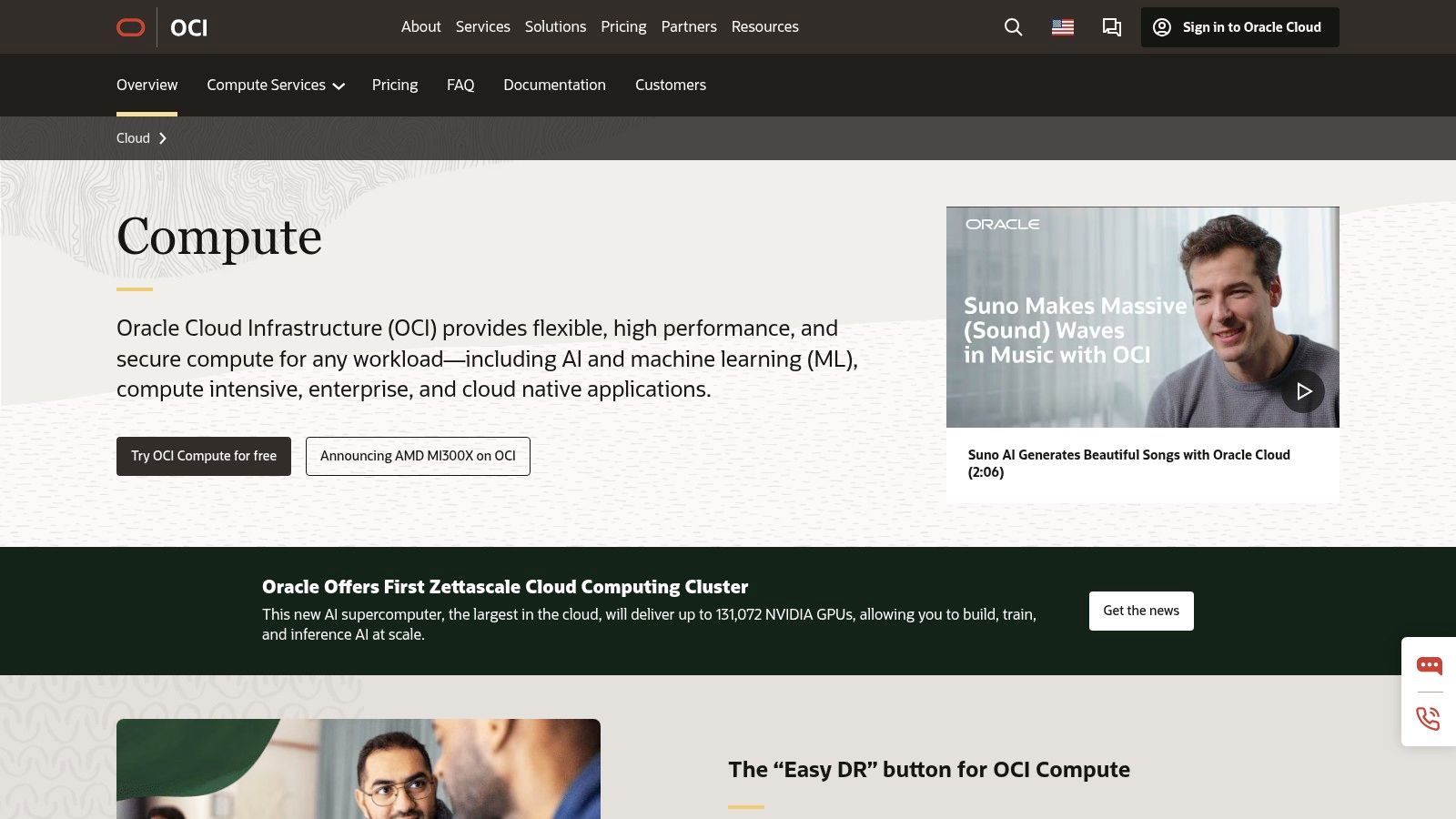
OCI’s bare metal “shapes” are designed for specific tasks, from standard compute to GPU-accelerated instances for AI/ML and Dense I/O shapes with massive local NVMe storage. For example, a business could provision a BM.DenseIO.E4.128 shape to run a high-transaction NoSQL database like ScyllaDB, leveraging the local SSDs to achieve millions of IOPS without network storage bottlenecks.
Features & Use Cases
OCI’s key differentiator is its focus on predictable high performance at a competitive price point, particularly for network and storage. The platform’s high-speed, non-oversubscribed network is a major benefit for distributed applications and large-scale data transfers. A typical technical setup involves creating a Virtual Cloud Network (VCN), defining subnets, and then launching a bare metal instance into a specific subnet, all manageable via the OCI console or Terraform provider.
- Pricing: OCI uses a per-second billing model after a one-hour minimum for bare metal instances. Its pricing is often aggressive, especially for network egress, which is significantly cheaper than other major cloud providers.
- Availability: While OCI’s global footprint is smaller than AWS or Azure, it is expanding rapidly with a focus on interconnected commercial and government regions across the U.S. and worldwide.
- Best For: Running Oracle databases, high-performance computing (HPC) simulations, large-scale analytics platforms, and any workload requiring low-latency, high-throughput local storage.
Website: https://www.oracle.com/cloud/compute/
| Feature Analysis | Assessment |
|---|---|
| Performance & Price | Excellent: Top-tier compute and I/O performance with a highly competitive pricing model, especially for networking. |
| Provisioning Speed | Good: Instances are typically available within minutes, though not always as instantaneous as top competitors. |
| Instance Variety | Good: Offers a strong selection of AMD, Intel, and NVIDIA GPU-based shapes for various specialized workloads. |
| Management Complexity | Fair: The OCI console is more streamlined than some rivals, but understanding its specific tenancy and networking concepts is key. |
Pros:
- Competitive performance/price for heavy I/O and database workloads
- Straightforward billing model once shapes are selected
- Generous network pricing with significant free egress traffic
Cons:
- Fewer U.S. regions compared to other hyperscalers
- Pricing tables are shape- and region-specific, often requiring the use of a calculator
4. Google Cloud – Bare Metal Solution
Google Cloud targets a specific, high-value niche with its Bare Metal Solution (BMS). Instead of offering general-purpose servers, Google provides specialized, subscription-based systems colocated in facilities adjacent to its cloud regions. This architecture is purpose-built to run enterprise workloads like Oracle databases that have stringent certification requirements or licensing tied to physical cores, which are often incompatible with standard cloud virtualization.
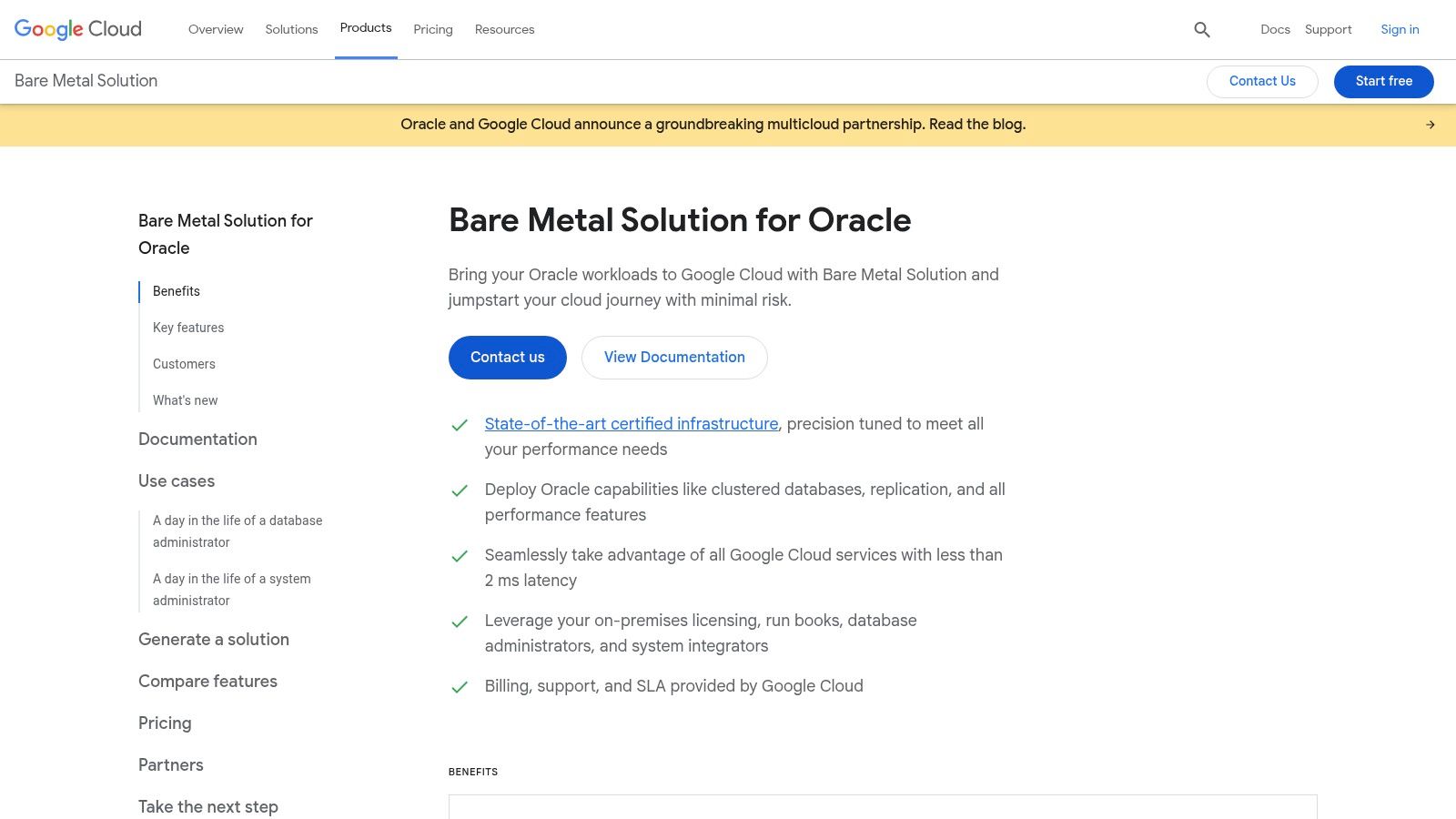
The key benefit is the ultra-low latency (<2 ms) private connection to the full suite of Google Cloud services. This allows a legacy Oracle RAC cluster, for instance, to run on certified dedicated hardware while seamlessly integrating with modern GCP services like BigQuery for analytics or Cloud Storage for backups, effectively bridging two different IT worlds. The technical setup involves establishing a Partner Interconnect connection between your BMS environment and your Google Cloud VPC, a managed service configured by Google.
Features & Use Cases
Google manages the facility, including power, cooling, and networking, while you retain full control over the operating system and software stack. This makes it one of the best bare metal server provider options for complex enterprise application migrations where hardware certification is non-negotiable.
- Pricing: BMS operates on a quote-based, subscription model. Engagement is typically through the Google Cloud sales team, often involving multi-year contracts (e.g., 36 months).
- Availability: Offered in numerous Google Cloud regions across the U.S. and globally, ensuring you can place your dedicated hardware close to your cloud resources.
- Best For: Enterprises migrating specialized Oracle, SAP, or other legacy applications to the cloud that require non-virtualized, certified hardware.
Website: https://cloud.google.com/bare-metal
| Feature Analysis | Assessment |
|---|---|
| Cloud Integration | Excellent: Designed for deep, private, and low-latency connectivity to GCP services. |
| Workload Specificity | Excellent: A premier solution for certified Oracle Database workloads, including RAC. |
| Pricing Flexibility | Poor: Requires sales engagement, long-term commitments, and is not suited for on-demand needs. |
| Management Complexity | Fair: While the hardware is managed, the customer is fully responsible for the OS, database, and application layers. |
Pros:
- Ideal for running Oracle RAC and other specialized enterprise databases
- Seamless, high-speed private connectivity to Google Cloud services
- No egress charges for data transfer between BMS and GCP in the same region
Cons:
- Pricing is not transparent; requires a custom quote and sales process
- Long-term contracts limit flexibility for short-term projects
5. IBM Cloud – Bare Metal Servers
For organizations with stringent compliance needs and performance-critical workloads, IBM Cloud offers enterprise-grade bare metal servers. Positioned as a premier provider for regulated industries, IBM delivers single-tenant servers that grant full hardware access without a hypervisor, ensuring maximum performance and security. This makes it an excellent choice for running databases, HPC applications, or certified Oracle deployments where direct hardware control is non-negotiable.
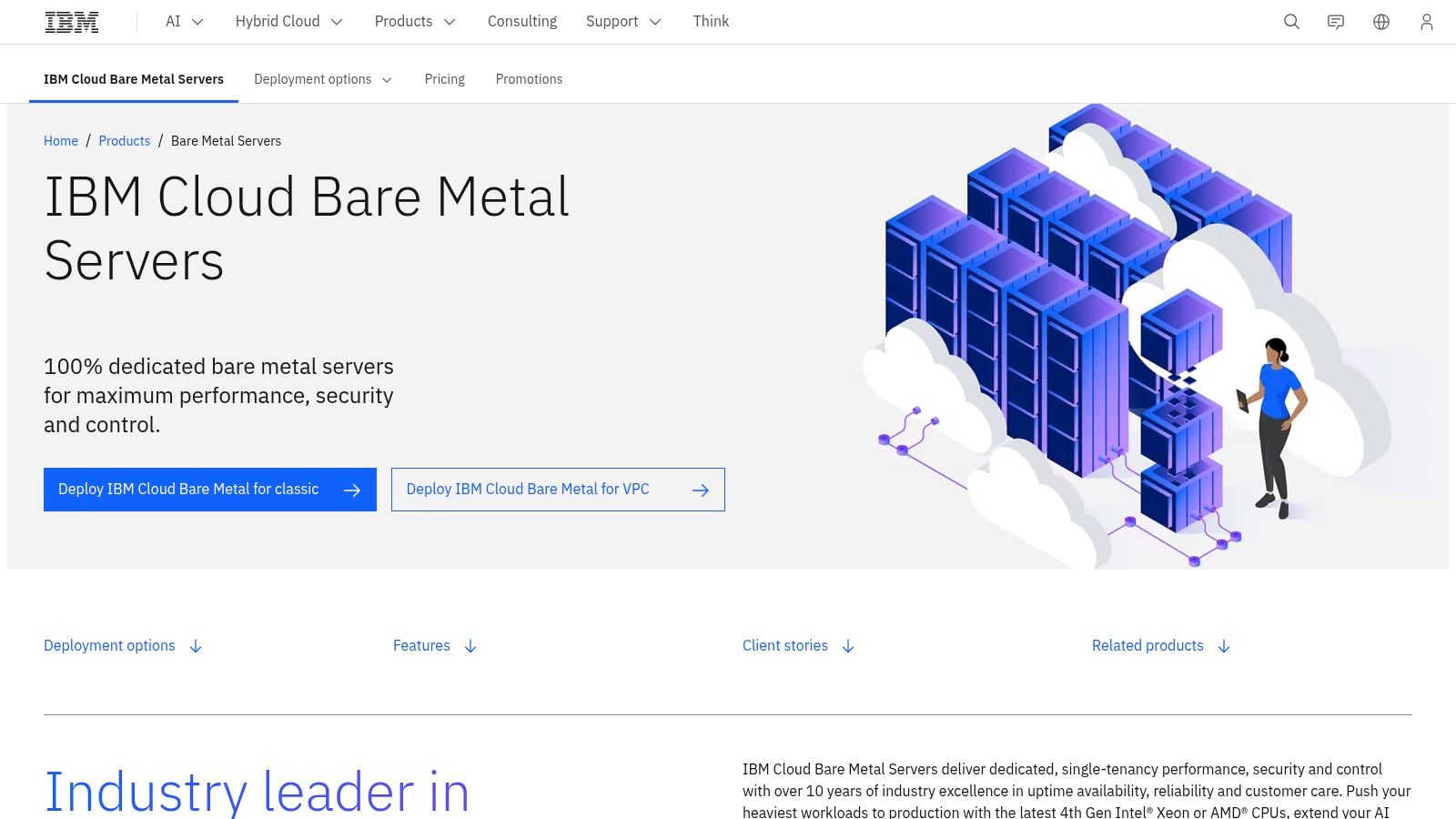
IBM’s offering stands out with its flexible infrastructure deployment, allowing you to provision servers on either classic infrastructure or within a modern Virtual Private Cloud (VPC) for enhanced network isolation. This dual approach provides a migration path for legacy systems while enabling new, cloud-native architectures on dedicated hardware. The broad hardware configurability allows for precise resource allocation to match specific application demands.
Features & Use Cases
What truly positions IBM as a top-tier bare metal server provider is its focus on enterprise reliability and generous data transfer allowances. You can deploy pre-configured servers rapidly or customize every component, from CPU and RAM to storage and networking, to build a truly bespoke environment. A technical example is using IBM’s Terraform provider to define a bare metal server within a VPC, specifying details like the OS image, SSH keys, subnet, and security groups all within a single .tf file for reproducible deployments.
- Pricing: Billing is flexible, with hourly, monthly, and reserved terms available to align with different project timelines and budgets. Reserved instances offer significant discounts for long-term commitments.
- Availability: IBM maintains a global network of data centers, with strong presence in the U.S. and Europe, where customers benefit from substantial cost-free bandwidth allocations (up to 20 TB on classic infrastructure).
- Best For: Companies running regulated workloads, certified Oracle deployments requiring Bring Your Own License (BYOL), and performance-sensitive applications that need predictable, single-tenant resources.
Website: https://www.ibm.com/cloud/bare-metal-servers
| Feature Analysis | Assessment |
|---|---|
| Enterprise Support | Excellent: Backed by robust SLAs and comprehensive support plans suitable for mission-critical operations. |
| Hardware Customization | Excellent: Extensive options to configure servers to exact specifications for CPU, RAM, storage, and networking. |
| Bandwidth Allowance | Good: Very generous cost-free outbound traffic in U.S. and EU regions, a significant cost-saver. |
| Pricing Transparency | Fair: The online configurator is powerful but can make price discovery complex; promotions often vary by region. |
Pros:
- Strong enterprise support and service-level agreements
- Certified hardware for Oracle BYOL and other enterprise software
- Fast provisioning and deep hardware configurability
Cons:
- Pricing can be complex and requires using the configurator tool
- Promotions and final costs can vary significantly by date and region
6. Equinix Metal – Bare Metal as a Service
Equinix Metal carved a niche by offering developer-friendly, API-driven bare metal as a service, emphasizing automation and network performance. Its key advantage has been its physical presence within Equinix data centers, providing unparalleled low-latency connectivity to major network and cloud providers. This made it a strong choice for edge computing, hybrid cloud, and latency-sensitive applications that benefit from being physically adjacent to the internet’s core infrastructure.
However, it is crucial to note that Equinix Metal is now in a sunset period. The company has ceased new commercial sales, and the service is scheduled to be fully decommissioned on June 30, 2026. While existing customers can continue using the platform until then, this makes it an unsuitable option for new projects. Its inclusion here acknowledges its historical significance and impact on the automated bare metal market.
Features & Use Cases
Equinix Metal’s platform was built for automation, allowing DevOps teams to provision and manage hardware entirely through its API, much like a cloud virtual machine. This programmatic control, combined with on-demand hourly billing and reserved instances, provided a flexible consumption model for physical servers. A common technical workflow involved using their Terraform provider to spin up a server, attach a block storage volume, and configure a private VLAN for secure communication between nodes, all without manual intervention.
- Pricing: Previously offered on-demand hourly billing, reserved capacity discounts, and a Spot Market (retiring June 20, 2025).
- Availability: Focused on key U.S. and global metro areas with high-density network interconnections.
- Best For: Historically, it excelled in edge computing, CI/CD workloads, and hybrid-cloud deployments requiring direct, low-latency links to colocation or public clouds.
Website: https://metal.equinix.com/
| Feature Analysis | Assessment |
|---|---|
| Automation & API | Excellent: Robust API and Terraform provider made infrastructure-as-code a primary feature. |
| Network Proximity | Excellent: Direct access to Equinix Fabric offered superior connectivity for hybrid cloud scenarios. |
| Service Longevity | Poor: The service is officially sunsetting and is not accepting new commercial customers. |
| Market Suitability | Not Recommended: Unsuitable for new deployments due to its scheduled end-of-life. |
Pros:
- Powerful automation through a well-documented API
- Exceptional network performance and adjacency to major cloud on-ramps
- Previously offered flexible, on-demand consumption models
Cons:
- Service is in sunset/maintenance mode with an end-of-life date
- No new commercial sales are being accepted
7. OVHcloud US – Bare Metal Dedicated Servers
OVHcloud has built a strong reputation in the European market for its aggressive price-to-performance ratio, and its US presence brings that value proposition to a broader audience. The company offers a vast catalog of bare metal dedicated servers segmented into distinct product lines like Rise, Advance, Game, Scale, and High-Grade. This approach allows users to select hardware precisely tailored to their needs, from entry-level web hosting to high-performance computing or specialized gaming servers.
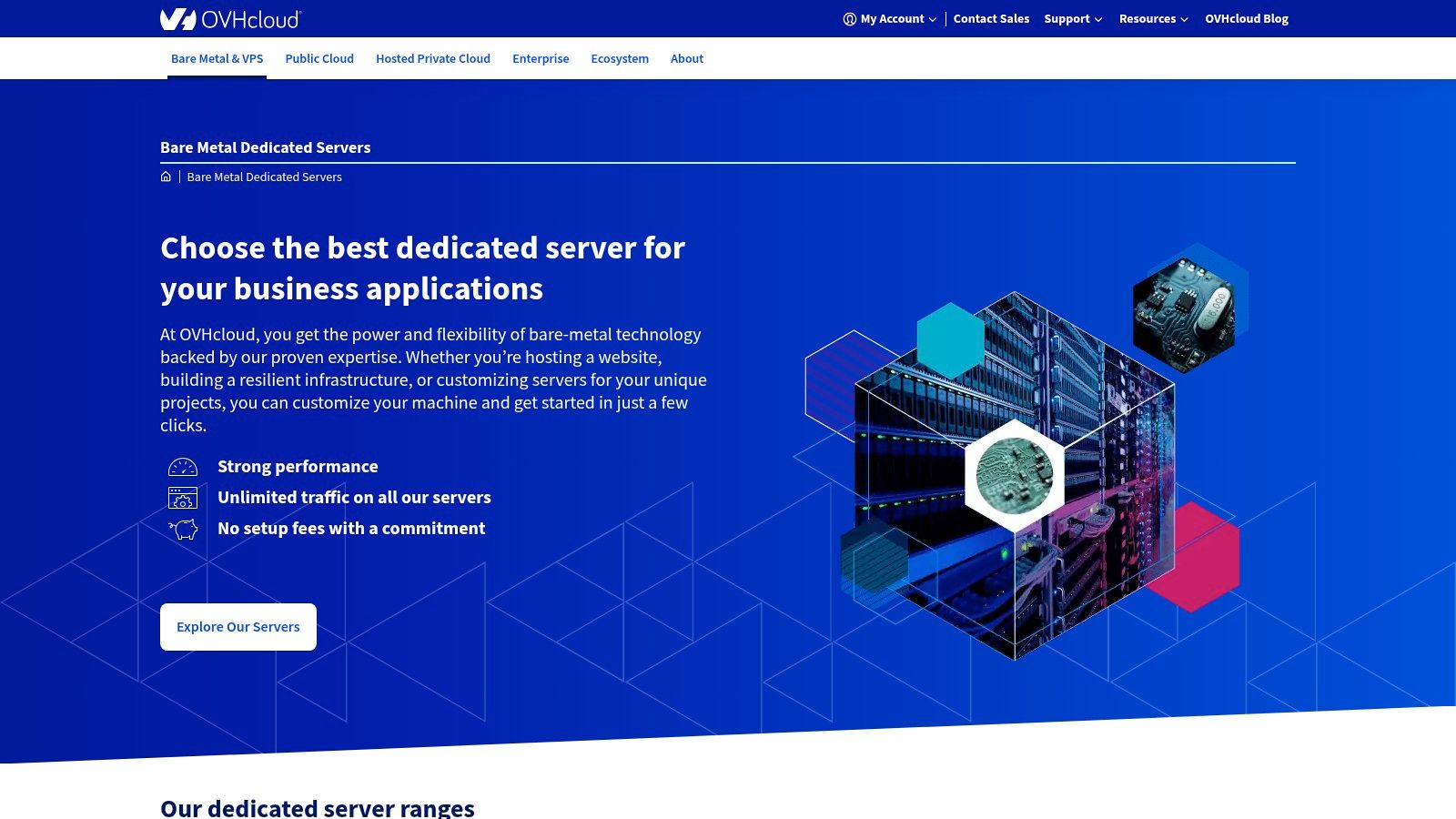
This provider stands out by often including high-bandwidth and unmetered traffic options, which can be a significant cost-saver for businesses with high data transfer needs. For those building a Proxmox private cloud, for example, the combination of powerful hardware and generous network allocation makes OVHcloud a compelling choice for a cost-effective best bare metal server provider. Their control panel allows for one-click OS installations of Proxmox, Ubuntu, or Windows Server, simplifying the initial setup.
Features & Use Cases
What makes OVHcloud particularly attractive is the sheer breadth of its hardware catalog, catering to a wide spectrum of use cases without forcing customers into a one-size-fits-all solution. Their fast ordering flow and lack of setup fees on many configurations simplify the procurement process.
- Pricing: Highly competitive, with clear monthly pricing. Commitments can reduce costs further, and there are no setup fees on many standard configurations.
- Availability: Data centers are available in both the East (Vint Hill, VA) and West (Hillsboro, OR) coasts of the United States, providing good geographic coverage for North American workloads.
- Best For: Small and medium-sized businesses, game server administrators, and MSPs looking for maximum hardware performance for their budget, especially when unmetered traffic is a key requirement.
Website: https://us.ovhcloud.com/bare-metal/
| Feature Analysis | Assessment |
|---|---|
| Price-to-Performance | Excellent: One of the most aggressive pricing structures in the market for raw hardware power and bandwidth. |
| Hardware Selection | Excellent: Extensive catalog with multiple server lines for everything from basic tasks to enterprise and GPU workloads. |
| Network Value | Good: Unlimited traffic options are a major differentiator, though DDoS protection levels vary by server line. |
| Stock & Availability | Fair: Specific high-demand configurations or locations can sometimes have limited or fluctuating stock. |
Pros:
- Aggressive pricing relative to many dedicated hardware competitors
- Large catalog covering gaming and enterprise variants
- Generous bandwidth with unmetered traffic options on many servers
Cons:
- Advanced features and stock availability can vary over time
- Support levels are tiered, with premium support incurring additional costs
8. Hivelocity – U.S. Bare-Metal/Dedicated Servers
Hivelocity stands out with its strong focus on the U.S. market, offering a straightforward and powerful bare metal server experience. The company emphasizes rapid provisioning, transparent pricing, and accessible, U.S.-based support, making it an excellent choice for businesses that value hands-on service and predictable costs without sacrificing performance. This approach provides a dependable foundation for developers and IT managers.
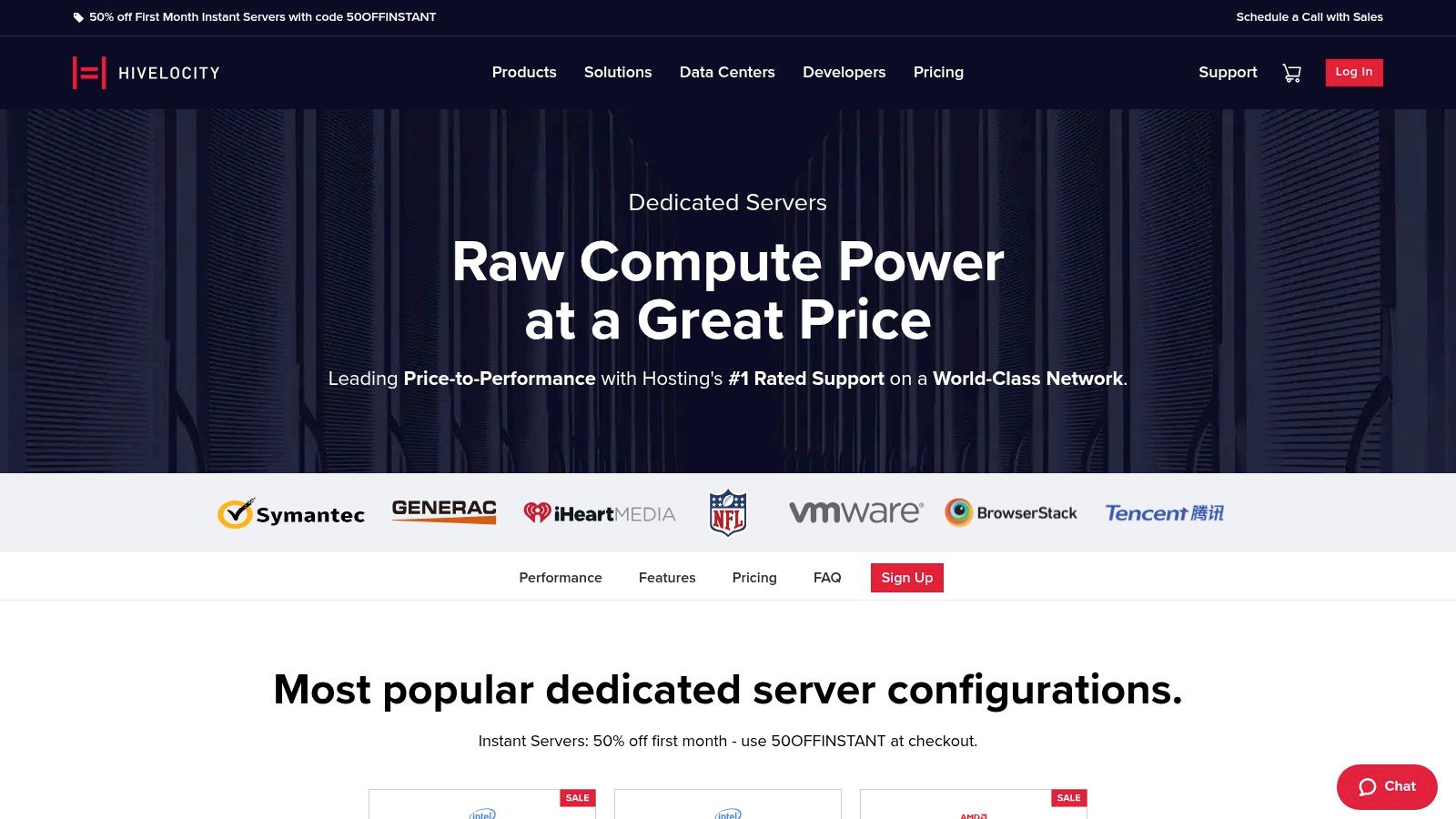
Their commitment to a customer-centric model is deeply ingrained in their operations, creating a reliable hosting environment. This philosophy has been a core part of their strategy for years, which you can see in firsthand accounts of their leadership and company culture. Hivelocity is a strong contender for those seeking one of the best bare metal server provider options without the complexity of a hyperscale cloud.
Features & Use Cases
What sets Hivelocity apart is the combination of instant-deploy servers and highly customizable configurations, all backed by 24/7 expert support. This flexibility caters to a wide range of needs, from simple web hosting to complex private cloud deployments using platforms like Proxmox. A technical user can leverage their portal to order a server, select an OS, and then use the provided IPMI credentials for remote console access to perform advanced configurations, such as custom disk partitioning or kernel tuning, immediately after provisioning.
- Pricing: Transparent, monthly pricing with no setup fees. Bandwidth is often bundled in generous packages, such as 100 TB, which simplifies cost forecasting.
- Availability: Operates multiple data centers strategically located across the United States, ensuring low-latency connections for a domestic audience.
- Best For: Small to medium-sized businesses, DevOps teams, and e-commerce sites needing high-performance hardware with reliable, easily-reachable support and predictable billing.
Website: https://www.hivelocity.net/dedicated-servers
| Feature Analysis | Assessment |
|---|---|
| Price-to-Performance | Excellent: Offers very competitive hardware configurations for the price, providing great value. |
| Customer Support | Excellent: Known for its responsive, U.S.-based technical support team with rapid response SLAs. |
| Network & Bandwidth | Good: Generous bandwidth allowances are included, but global reach is less extensive than hyperscalers. |
| Configuration Options | Good: A solid mix of pre-configured instant servers and custom-built options are available. |
Pros:
- Strong price-to-performance ratio versus competitors
- Hands-on, U.S.-based support with quick response times
- Transparent pricing with no hidden setup fees
Cons:
- Custom quotes may be required for highly specialized, non-standard configurations
- Marketing comparisons can be simplified; always verify specs for a true like-for-like evaluation
9. phoenixNAP – Bare Metal Cloud
PhoenixNAP targets developers and DevOps teams with its API-first Bare Metal Cloud platform, merging the speed of cloud services with the power of dedicated hardware. This offering is designed for automation, allowing users to provision and manage servers programmatically using tools like Terraform, Ansible, or its native API. This focus on automation makes it a strong contender for CI/CD pipelines, container orchestration, and other dynamic workloads.
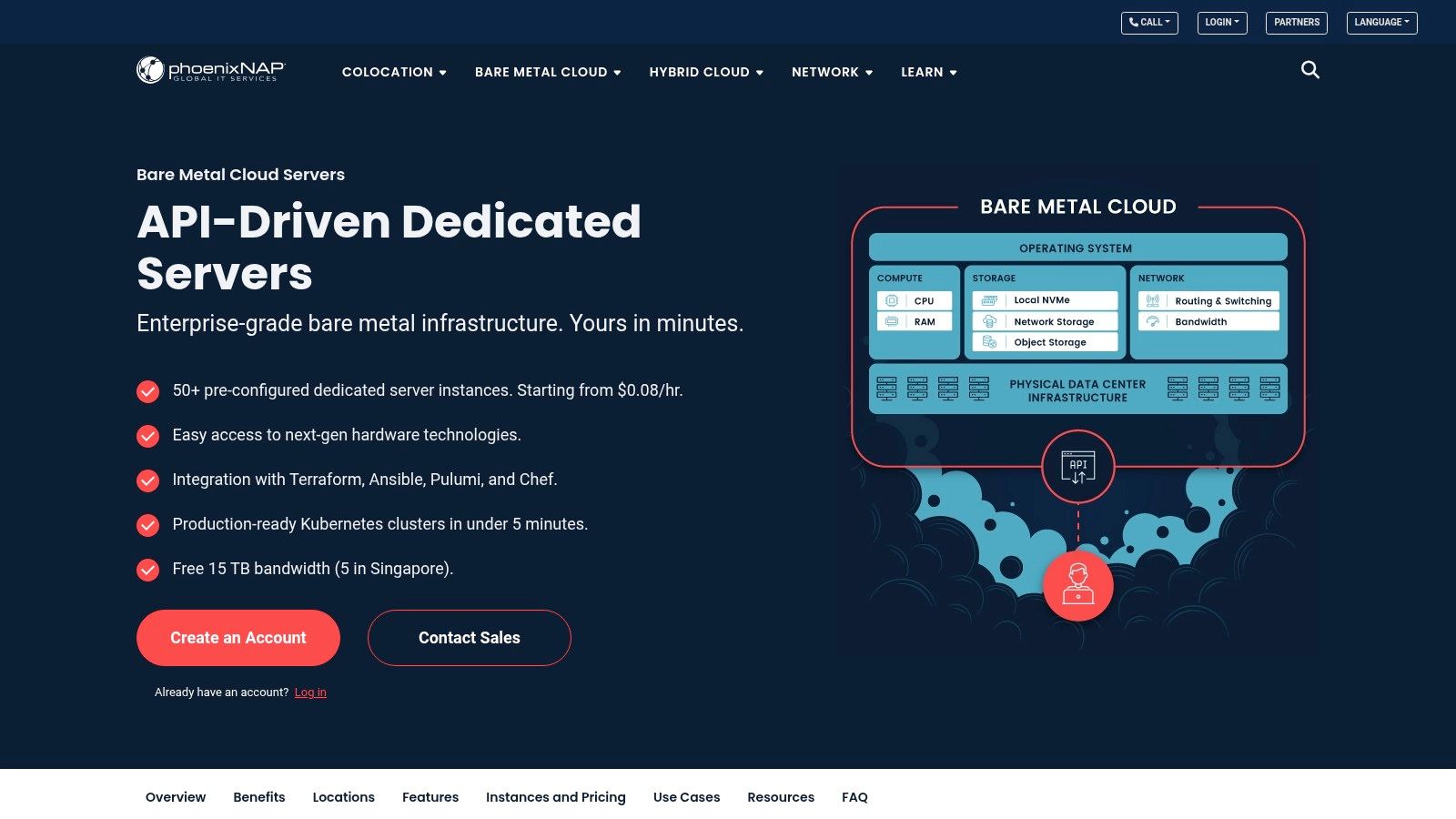
The platform’s key differentiator is its billing model. Unlike many providers that lock you into monthly contracts, phoenixNAP offers true hourly billing, providing significant cost savings for temporary or fluctuating resource needs. For example, you can spin up a powerful server for a few hours to run a complex data processing job and then destroy it, paying only for the time used.
Features & Use Cases
PhoenixNAP provides a diverse selection of pre-configured instances optimized for various tasks, from general compute to memory-intensive applications and even GPU-powered AI/ML workloads. Support for cloud-init allows for extensive post-provisioning customization. For instance, a DevOps engineer could use a cloud-init YAML file to automatically create user accounts, install Docker, and pull a specific container image on the server’s first boot, making the machine application-ready in minutes.
- Pricing: True hourly billing with no long-term commitment. A promotional 15 TB of free outbound bandwidth is included with the first server deployed in each location.
- Availability: Data centers are strategically located across the U.S., Europe, and Asia, with options for private connectivity through partners like Megaport.
- Best For: DevOps teams building automated infrastructure, businesses needing short-term high-performance compute, and developers who require API-driven server management.
Website: https://phoenixnap.com/bare-metal-cloud
| Feature Analysis | Assessment |
|---|---|
| Automation & API | Excellent: Robust API, SDKs, and integrations with popular IaC tools like Terraform and Ansible. |
| Provisioning Speed | Excellent: Servers are typically provisioned and accessible in under two minutes. |
| Pricing Flexibility | Excellent: True hourly billing offers granular cost control unmatched by most traditional providers. |
| Bandwidth Model | Fair: The promotional bandwidth is a great start, but requires careful planning for sustained high-egress workloads. |
Pros:
- Granular per-hour pricing is ideal for temporary workloads
- Fast, automated deployment via a modern API
- Good mix of Intel CPU generations and storage options
Cons:
- Promotional bandwidth is limited to the first deployment per location
- Calculating bandwidth costs for heavy egress requires careful planning
10. Leaseweb USA – Dedicated (Bare-Metal) Servers
Leaseweb offers a robust and highly customizable bare metal server experience focused on the U.S. market. With a strong presence across nine data centers from coast to coast, it provides a solid foundation for businesses requiring low-latency access for American audiences. Their offering is particularly well-suited for gaming, SaaS, and content delivery workloads that benefit from a blended Tier-1 carrier network and generous data transfer allowances.
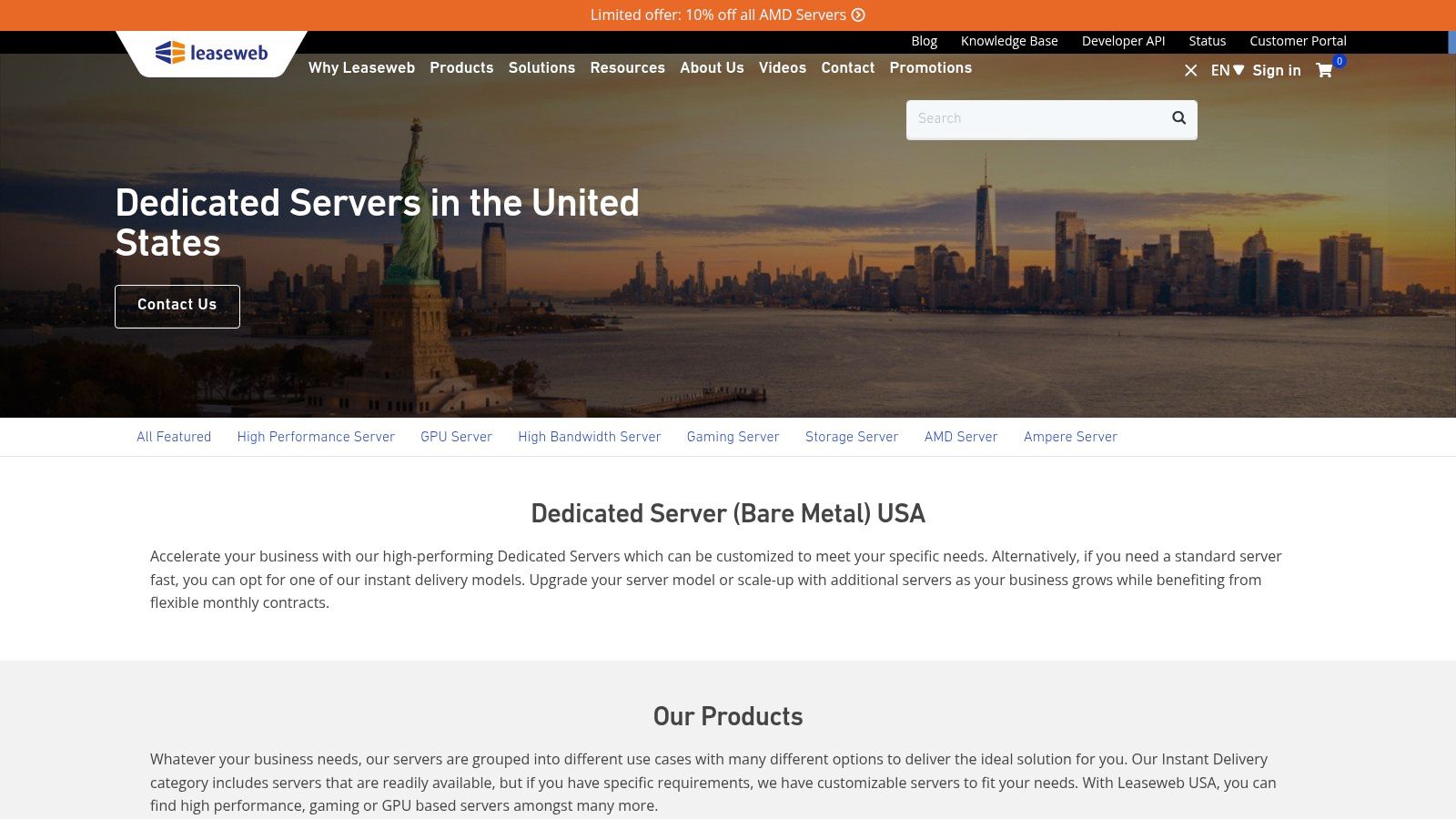
This provider stands out by giving users granular control over their hardware configurations while also offering managed hosting tiers for those who prefer to offload administrative tasks. The inclusion of IPMI, iDRAC, or iLO access by default gives technical teams the direct, out-of-band management capabilities needed for advanced troubleshooting and OS installations, making Leaseweb an attractive choice for DevOps teams.
Features & Use Cases
Leaseweb’s platform is built on flexibility and network performance. Every server comes with a standard 10 TB of public data transfer, with options for higher tiers and unmetered private networking for building secure, multi-server architectures without worrying about internal traffic costs. A common technical use case is ordering multiple servers with both public and private network interfaces. The private network can then be used for database replication or storage traffic between servers, while the public network handles user-facing application traffic, creating a secure and efficient two-tier architecture.
- Pricing: Configuration-based pricing means you pay for what you need. While transparent, costs can increase with traffic upgrades, managed services, and other add-ons.
- Availability: Excellent U.S. footprint with data centers in key locations like Dallas, Miami, and Los Angeles, ensuring broad geographic coverage.
- Best For: Media streaming, online gaming platforms, and SaaS applications that need customizable hardware and a strong network backbone within the United States.
Website: https://www.leaseweb.com/products-services/dedicated-servers/usa
| Feature Analysis | Assessment |
|---|---|
| Network Performance | Excellent: A strong blend of Tier-1 carriers and multiple U.S. data centers provides reliability and speed. |
| Customization | Excellent: Extensive options for CPU, RAM, storage, and networking allow for precisely tailored server builds. |
| Cost Transparency | Good: Base pricing is clear, but the total cost can vary significantly based on selected add-ons and support tiers. |
| Support Options | Good: Offers 24/7 support with optional managed service tiers for proactive server administration and monitoring. |
Pros:
- Solid U.S. footprint with a high-quality network blend
- Highly flexible server configurations and optional management tiers
- Generous default data transfer and unmetered private network options
Cons:
- Pricing can become complex as features and traffic are added
- Best value is concentrated within their U.S. data center locations
11. Vultr – Bare Metal
Vultr brings a developer-centric, cloud-like experience to bare metal, making it an excellent choice for teams that value speed, automation, and straightforward billing. Instead of long-term contracts, Vultr offers hourly-billed physical servers that can be provisioned in minutes via a clean web console or a powerful command-line interface (CLI). This model provides the raw power of dedicated hardware with the flexibility typically associated with virtual machines.
This approach is ideal for developers, startups, and SMBs needing high-performance infrastructure without the management overhead or complex pricing of larger cloud providers. Vultr’s platform is designed for rapid deployment of applications, continuous integration/continuous delivery (CI/CD) build agents, or any workload that benefits from direct, uncontended access to CPU and I/O resources across its U.S. and global locations.
Features & Use Cases
What sets Vultr apart is its radical simplification of the bare metal provisioning process. You can use their vultr-cli tool to script server creation, OS installation, and destruction, making it a powerful component of an infrastructure-as-code workflow. For example, a developer can run a simple command like vultr-cli bare-metal create --region ewr --plan vbm-4c-32gb --os 215 to provision a 4-core, 32GB RAM server in New Jersey running Ubuntu 22.04 in under five minutes. This makes Vultr a strong contender for anyone looking for a reliable bare metal server provider.
- Pricing: Servers are billed hourly up to a monthly cap (672 hours). This hybrid model offers predictability for long-running workloads while providing flexibility for short-term tasks.
- Availability: Vultr operates data centers in multiple U.S. metros, including Miami, Chicago, and Seattle, alongside a significant global presence.
- Best For: Developer-led teams, CI/CD pipelines, high-I/O applications, and businesses that need the performance of dedicated hardware with the on-demand flexibility of the cloud.
Website: https://www.vultr.com/bare-metal/
| Feature Analysis | Assessment |
|---|---|
| Provisioning Speed | Excellent: Fully automated deployments are completed in minutes, rivalling virtual server spin-up times. |
| Developer Experience | Excellent: A well-documented API and powerful CLI make automation and integration straightforward. |
| Pricing Model | Good: The hourly billing with a monthly cap is simple and predictable, but costs accrue until a server is destroyed. |
| Plan Transparency | Fair: Discovering the exact server plans and pricing for specific locations often requires logging into the console or using the API/CLI. |
Pros:
- Extremely fast, developer-friendly provisioning process
- Simple, transparent hourly billing with a monthly rate cap
- Strong API and CLI for complete infrastructure automation
Cons:
- Billing continues for stopped servers; they must be destroyed to halt charges
- Hardware selection can be more limited compared to larger, traditional providers
12. Liquid Web – Dedicated/Bare-Metal Servers
Liquid Web has built a strong reputation around its high-touch, fully managed hosting solutions, making it a standout choice for businesses that prioritize expert support. Their bare metal servers are designed for agencies, e-commerce stores, and mission-critical applications where performance and reliability are non-negotiable. This provider blends powerful hardware with an accessible, human-centric support model that appeals to users who want a partner, not just a platform.
Unlike unmanaged or cloud-only providers, Liquid Web focuses on offering a complete service package. This includes proactive monitoring, security hardening, and 24/7/365 access to what they call “The Most Helpful Humans in Hosting.” For those new to this level of control, understanding how to manage dedicated servers is a crucial first step, and Liquid Web’s support helps bridge that gap.
Features & Use Cases
Liquid Web’s value proposition is its combination of robust hardware and exceptional managed services. They offer clear, pre-configured server plans with instant deployment capabilities, removing the long wait times often associated with traditional dedicated hosting. A common technical scenario involves a digital agency choosing a fully managed server with the cPanel control panel. This allows them to easily create and manage hosting accounts for multiple clients, while Liquid Web’s team handles all backend server maintenance, OS updates, and security patching, ensuring a stable environment.
- Pricing: Plans are published with clear specifications. New customers often benefit from significant promotional pricing, but it’s important to verify long-term renewal rates.
- Availability: Data centers are strategically located in the U.S. (Michigan, Arizona) and Europe (Amsterdam), providing good options for North American and European audiences.
- Best For: E-commerce sites using Magento or WooCommerce, digital agencies managing multiple client sites, and businesses running high-traffic applications that require a hands-on, managed support team.
Website: https://www.liquidweb.com/dedicated-servers/
| Feature Analysis | Assessment |
|---|---|
| Customer Support | Excellent: Renowned for its 24/7/365 expert support with fast response time guarantees. |
| Ease of Use | Excellent: Fully managed options with cPanel or Plesk simplify server administration significantly. |
| Pricing Transparency | Good: Plans are clearly listed, but promotional rates can differ from standard renewal costs. |
| Hardware Customization | Fair: Offers a solid range of pre-configured Intel Xeon servers but less build-to-order flexibility than larger providers. |
Pros:
- Industry-leading 24/7 managed support and service level agreements
- Clear, published plans with instant-deploy options
- Includes valuable add-ons like DDoS protection and control panels
Cons:
- Promotional pricing for new accounts can be misleading for long-term budgeting
- Less geographic diversity in data centers compared to hyperscalers
Top 12 Bare-Metal Server Providers Comparison
| Provider | Core offerings | Quality (★) | Pricing/value (💰) | Target (👥) | Unique selling points (✨/🏆) |
|---|---|---|---|---|---|
| ARPHost, LLC 🏆 | Bare metal, KVM VPS, Proxmox private cloud, PBaaS, VOIP, colocation, instant apps | ★★★★☆ (4.1) | 💰 VPS $4+, Bare metal $99.99+, transparent pricing | 👥 SMBs, devs, MSPs, e‑commerce | ✨ Proxmox + immutable encrypted backups, 24/7 U.S. hands‑on support, rapid provisioning |
| AWS – EC2 Bare Metal | .metal instances with EBS, VPC, ELB, CloudWatch ecosystem | ★★★★★ | 💰 Pay‑as‑you‑go / Reserved / Spot — flexible but can be costly (egress) | 👥 Enterprises, large apps, lift‑and‑shift | ✨ Deep ecosystem & enterprise tooling, global regions |
| Oracle Cloud (OCI) Bare Metal | True bare‑metal shapes (Std, Dense I/O, GPU) optimized for I/O/DB | ★★★★ | 💰 Competitive for heavy I/O; shape & region dependent | 👥 DB/HPC, licensed workloads | ✨ Dense NVMe I/O, GPU shapes, strong perf/price for DBs |
| Google Cloud – Bare Metal Solution | Colocated subscription BMS with private low‑latency link to GCP | ★★★★ | 💰 Quote/term based (often long commitments) | 👥 Oracle DB, legacy enterprise apps | ✨ <2 ms private connectivity to GCP; managed facility |
| IBM Cloud – Bare Metal | Single‑tenant bare metal (classic/VPC), hourly/monthly/reserved | ★★★★ | 💰 Enterprise pricing; notable bandwidth allowances | 👥 Regulated workloads, Oracle environments | ✨ Enterprise SLAs, certified Oracle support, strong support options |
| Equinix Metal | API‑driven bare metal with metro network adjacency | ★★★ | 💰 On‑demand/reserved (service in sunset → migration planning) | 👥 Edge, colo‑adjacent, network‑centric users | ✨ Strong automation & network proximity — service sunsetting (plan migration) |
| OVHcloud US – Bare Metal | Wide dedicated server catalog (Rise, Advance, Game, Scale) | ★★★★ | 💰 Value‑focused; aggressive price‑to‑performance | 👥 Gaming, SMBs, price‑sensitive workloads | ✨ Large catalog, unlimited traffic options, published SLAs |
| Hivelocity – Dedicated | U.S. bare‑metal with instant & custom options, managed tiers | ★★★★ | 💰 Competitive, transparent pricing | 👥 SMBs, agencies, gamers | ✨ Rapid provisioning, U.S. 24/7 support, clear bandwidth tiers |
| phoenixNAP – Bare Metal Cloud | API‑first bare metal, hourly billing, pre‑configs, private connectivity | ★★★★ | 💰 Hourly true billing + promo bandwidth (first deploy) | 👥 Devs, AI/DB workloads | ✨ True hourly billing, cloud‑init, promo 15 TB outbound first deployment |
| Leaseweb USA – Dedicated | Customizable dedicated servers, unmetered private networking | ★★★★ | 💰 Variable; upgrades/add‑ons can raise cost | 👥 SaaS, CDNs, gaming | ✨ IPMI/iDRAC by default, multi‑DC footprint, carrier blend |
| Vultr – Bare Metal | Hourly bare‑metal with self‑service console/CLI, developer tools | ★★★★ | 💰 Hourly with monthly cap (dev‑friendly) | 👥 Developers, startups | ✨ Fast self‑service provisioning, CLI/automation focus |
| Liquid Web – Dedicated | Managed & self‑managed dedicated with published plans, 24/7 support | ★★★★ | 💰 Clear plans; promos for new accounts (verify renewals) | 👥 Agencies, e‑commerce, DBs needing support | ✨ Strong 24/7 managed support, instant deploy options |
Making the Right Choice: Final Thoughts on Your Bare Metal Strategy
Navigating the landscape of dedicated hosting can feel complex, but this comprehensive review has demystified the offerings from the industry’s leading providers. We’ve journeyed from the vast ecosystems of hyperscalers like AWS and Google Cloud to the specialized, high-touch services offered by providers such as ARPHost and Hivelocity. The central lesson is clear: the best bare metal server provider is not a one-size-fits-all title but a designation that depends entirely on your specific technical requirements, operational style, and business goals.
The choice you make will fundamentally shape your application’s performance, scalability, and total cost of ownership. Your final decision should be a strategic one, balancing raw power with the practicality of management and support.
Key Takeaways and Strategic Considerations
Reflecting on our analysis, several core themes emerge that should guide your selection process. Hyperscalers like AWS, OCI, and Google Cloud excel in providing API-driven, on-demand bare metal that integrates seamlessly into a broader cloud-native workflow. They are ideal for teams with deep DevOps expertise who need to provision and tear down environments rapidly, often alongside other cloud services like managed databases or serverless functions. However, this flexibility can come at the cost of complex, usage-based billing and a support model that often requires premium-tier payments for direct, expert assistance.
In contrast, providers like ARPHost, Liquid Web, and phoenixNAP represent a different philosophy. They combine the raw performance of dedicated hardware with robust managed services, transparent pricing, and personalized support. For SMBs, e-commerce site owners, and IT teams without a large in-house staff, these providers act as a direct extension of your own team. They handle the underlying infrastructure management, security patching, and network configuration, freeing you to focus on your core business applications.
Actionable Next Steps: From Selection to Implementation
Your journey doesn’t end with selecting a provider. The real work begins with implementation and a forward-thinking lifecycle strategy. Here are the critical next steps to ensure a successful deployment:
- Define Your Workload Profile: Before signing any contract, precisely document your application’s needs. Is it CPU-intensive (like video encoding), memory-intensive (like large databases or in-memory caches), or I/O-bound (like high-traffic web servers)? A provider like Equinix Metal might be perfect for edge computing, while a Vultr instance could offer a cost-effective solution for a global development environment.
- Conduct Performance Benchmarking: Do not rely solely on marketing materials. Once you have a shortlist, deploy a test instance with each provider and run your own benchmarks. Use tools like
sysbenchfor CPU and memory tests,fiofor disk I/O, andiperffor network throughput. This empirical data is invaluable for making an informed decision about the best bare metal server provider for your specific workload. - Evaluate the Support Experience: The quality of technical support can make or break your experience. Before committing, engage with the pre-sales and technical support teams of your top contenders. Ask detailed technical questions related to your use case, such as “How would I configure a private network between two of your bare metal servers in different data centers?” Their responsiveness and the quality of their answers will reveal a lot about their operational maturity.
- Plan for the Full Lifecycle: A complete bare metal strategy extends beyond deployment. Consider how you will manage the hardware over its lifespan, including OS updates, security hardening, and eventually, its retirement. Beyond initial setup, a comprehensive bare metal strategy should also account for the secure server decommissioning of servers at the end of their lifecycle to protect sensitive data.
Ultimately, choosing the right provider is about finding a partner whose technical capabilities align with your workload and whose service model complements your team’s expertise. Use this guide as your foundation, but trust your own testing and due diligence to make the final call. The right bare metal foundation will empower your applications to perform at their absolute peak, providing a stable and powerful home for your most critical digital assets.
Ready to experience the power of dedicated performance combined with expert, hands-on support? ARPHost, LLC offers a full suite of bare metal solutions, managed services, and private cloud deployments designed to meet the demands of modern businesses. Explore our customizable server configurations and discover how a true infrastructure partner can help you achieve your goals.


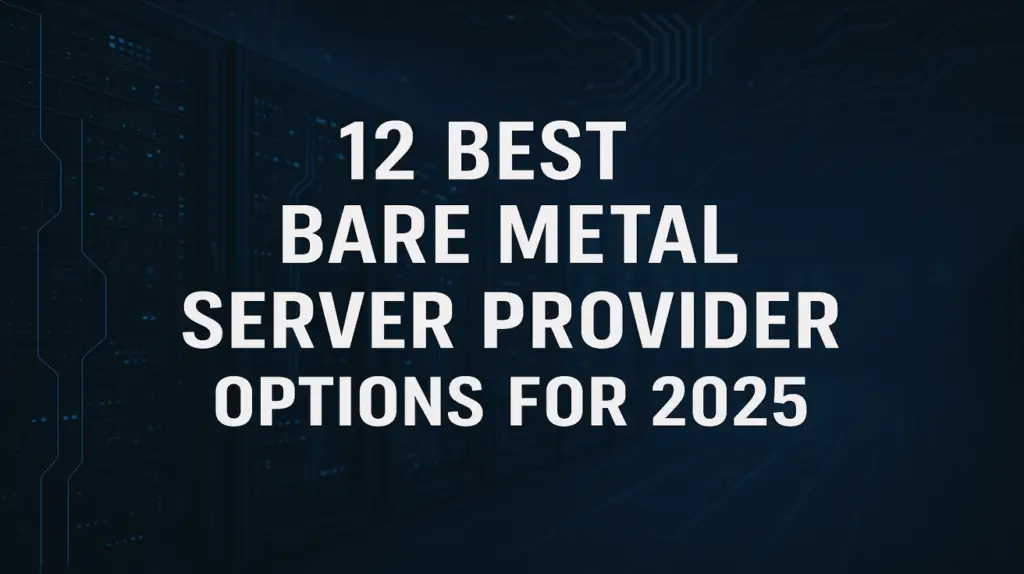
[…] any business that needs top-tier performance and stability without the budget anxiety, finding the best bare metal server provider is the next logical step. An unmetered bare metal server gives you the raw power you need with the […]